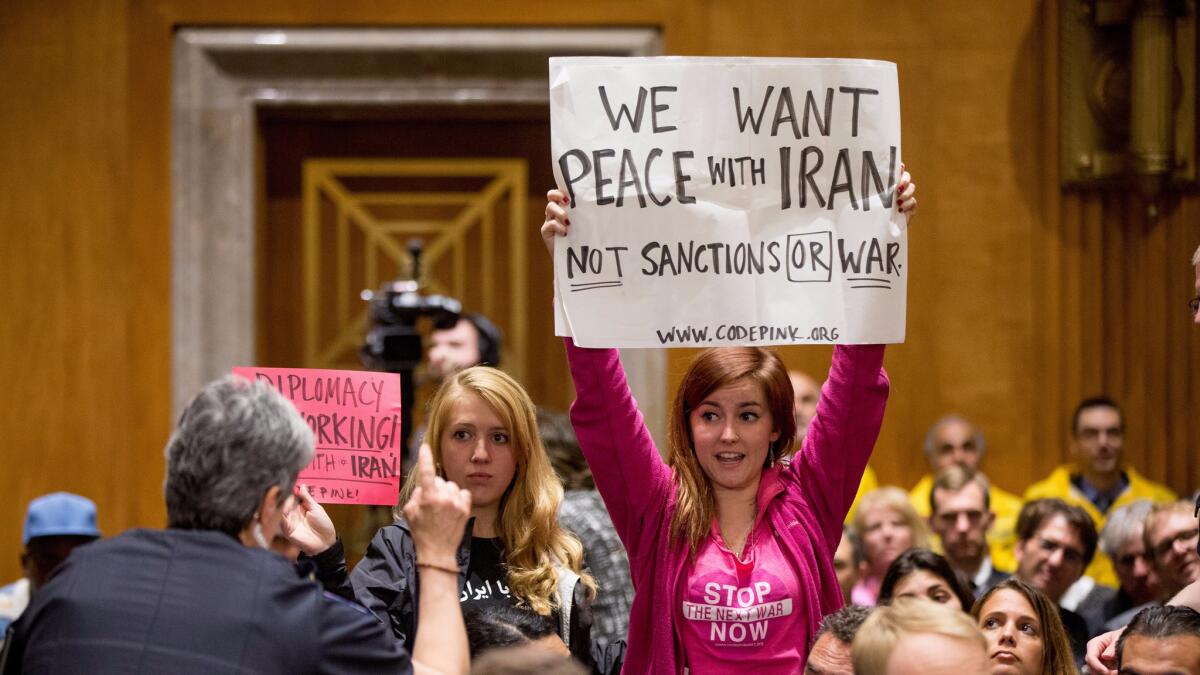One year later, White House claims success in Iran nuclear deal

- Share via
Reporting from Washington — A year after the United States and five other world powers signed a historic nuclear deal with Iran, the most steadfast supporters and the most fervent detractors can both say they were right.
Neither faction can claim full victory. But nor has the deal flopped.
Iran, for the most part, has complied with the agreement to crimp its ability to build nuclear weapons, allowing the Obama administration to take credit for averting a Middle Eastern arms race and making, as Secretary of State John Kerry said Thursday, “a safer world.”
Conservatives who opposed the agreement both here and abroad can assert -- also correctly -- that nothing has held Iran back from other illicit activities, such as the financing of terrorism, curtailing of human rights and jailing of dual-national opponents. The deal’s terms focused only on curtailing Iran’s nuclear program.
Those hoping for moderation from Iran as a result of the detente are left holding a mixed bag.
Iran saw numerous moderates elected to Parliament over the last year. But anti-Western hardliners also reasserted themselves, and the financial windfall that many Iranians had come to expect from lifting of sanctions has not materialized.
“A program that so many people said will not work, a program that people said is absolutely doomed to see cheating and be broken and will make the world more dangerous, has, in fact, made the world safer, lived up to its expectations,” Kerry said in Paris.
He said Iran has met “its part of this bargain and obligation.”
President Obama also praised the nuclear deal for ending a major threat. In a White House statement, he hailed “what can be achieved by principled diplomacy.”
None of that has discouraged U.S. critics from trying to torpedo the year-old deal.
Before leaving on summer break, the Republican-controlled House passed legislation banning purchase of heavy water from Iran, a byproduct that can be used for nuclear production. (U.S. purchase of the material is authorized under the deal, which requires Iran to shed excess amounts of heavy water.)
Obama has vowed to veto the bill if it reaches his desk, and Rep. Eliot Engel of New York, the senior Democrat on the House Foreign Relations Committee who opposed the Iran agreement, accused the Republicans of “political theater.”
A bi-partisan group of senators, meanwhile, announced they would sponsor a bill to expand sanctions on Iran for ballistic missile development and “support for terrorism.”
“We need to look no further than Iran’s dangerous and destabilizing activities to see the disaster that the Iran nuclear agreement has been over the last year,” said Sen. Marco Rubio (R-Fla.), one of the sponsors.
Similarly, some members of Congress are attempting to block a reported sale by the Boeing Co. of 80 to 100 passenger jets to Iran. It would be the first major commercial deal between a U.S. company and the Islamic Republic in decades.
The Boeing sale is the sort of business that many expected would follow lifting of key international sanctions that had been imposed on Iran because of its nuclear program.
As part of the deal signed a year ago, Iran dismantled the core of its main nuclear reactor, got rid of thousands of centrifuges and shipped out 98 % of its enriched uranium stockpile.
In exchange, several sanctions were lifted and billions of dollars in frozen assets were released.
Critics claimed, incorrectly, that Iran would get $150 billion; even a more accurate $50 billion has not yet flowed into Iranian coffers.
In part, that’s because of low oil prices as Iran reentered the global market as well as the skittishness many businesses and investors still have in working with Iran and its turgid banking system.
If Iran doesn’t reap economic benefits, analysts warn, popular support for the nuclear deal, which was strong, could erode. The government of President Hassan Rouhani has blamed the U.S. for continuing to block international investment.
“A real threat to the [agreement] is that Iran will blame the slow recovery of its economy on U.S. failure to conscientiously fulfill its sanctions-relief commitments and, using that as a pretext, will curtail or even end its own implementation of the deal,” Robert Einhorn, an arms control expert for the non-partisan Brookings Institution, wrote in an analysis for the organization’s website.
As Obama’s second term enters its final months, he and Kerry hope to cite an eased nuclear threat from Iran as a cornerstone of their foreign policy legacy, along with rapprochement with Cuba after half a century of official hostility.
Unlike the warming relationship with Havana, however, the U.S. has gained little else from the nuclear deal with Tehran.
“America’s willingness to engage directly with Iran opened the door to talks,” Obama said. But he added, “serious differences remain.”
ALSO
Doctors travel a dangerous road to help ease the horrors of war-torn Aleppo, Syria
Pentagon to increase U.S. troops in Iraq to help prepare assault on Mosul
Egypt wants to revive the Israeli-Palestinian peace process
More to Read
Sign up for Essential California
The most important California stories and recommendations in your inbox every morning.
You may occasionally receive promotional content from the Los Angeles Times.










